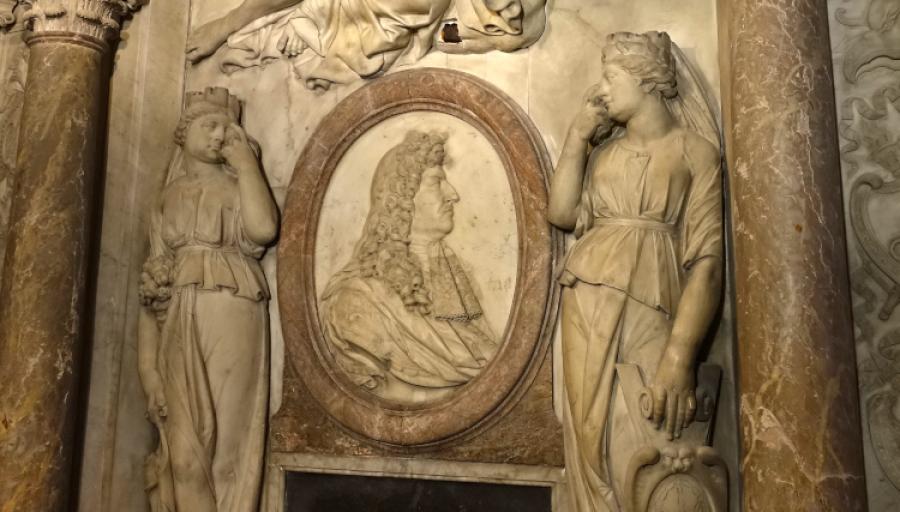From the Archives – “Only God Is Great”
Image

The Protestant Reformation of the sixteenth century triggered a fresh wave of bloody conflict in Medieval Europe—a tract of real estate across which evolving nations had suffered tumultuous relations for many dark centuries. Protestant regions broke up Rome’s monopoly on authority in Europe. Neutralizing an authority is one thing; replacing it is quite another matter, and Europe tumbled into near-anarchy. Nation warred against nation and region against region in an all-out scramble to gain control of the rudder of Europe’s destiny.
Out of the context of these chaotic and violent times sprouted a philosophy of governance known as “Monarchial Absolutism.” Absolutist political theory held that Europe’s only hope for avoiding anarchy was for monarchs of the emerging European nations to wield unrestrained power. The cohesive influence Rome had once supplied Europe could be recovered, so it was proposed, by monarchs willing to impose their will with absolute sovereignty over their subjects. (One may detect a less than ideal environment for the human rights of dissenters under such a system. The half of that tragic subplot has never been told.)
Historians generally recognize Louis XIV of France (1638-1715) as the quintessential absolutist monarch. Crowned at age five (a monarchial absolutist pre-schooler—you fill in the blanks!), Louis reigned in earnest from 1660 until his death. That translates into fifty-five years of absolute sovereignty over every aspect of French life. Every citizen, of what was at that time the most powerful nation on the continent, was expected to conform to Louis’ every belief, obey his every demand, and honor his every decision. Imagine!
Louis occupied the renowned Palace of Versailles just outside Paris—the most elaborate construction project of the century. To this day both palace and grounds gleam with exquisite splendor. Several thousand nobles lived at Versailles in Louis’ day and were attended by 4,000 servants. Louis was dressed with ceremonial attention each morning by men of noble birth. He and his fellow noblemen at Versailles lived alongside one another in splendorous luxury. They passed their days attending lavish banquets, receptions, concerts, plays, and balls. They spent inordinate amounts of time gambling and hunting. Any time that remained seemed to be filled with gossip, flattery, and lecherous living.
Louis was widely known as the Sun King in reference to his royal emblem, for which the center of the solar system was deemed a fitting symbol. Louis was also known by his many admirers on the continent as the Grand Monarch. To remove any doubt as to where he stood on the theory of monarchial absolutism, Louis liked to remind people: “I am the state.” Few cared to argue the point, even fewer dared. Louis’ preferred title was “Louis the Great.” Indeed, achieving greatness was Louis’ chief vocation. A more magnificent reign can hardly be imagined.
Living under Louis’ domain at the height of his monarchial greatness, was a soft-spoken priest named Jean Baptiste Massillon (1663-1742). Massillon’s gift for preaching soon elevated him to positions of high responsibility in the Roman Church. Head of the famous seminary of Saint Magloire in Paris, Massillon was appointed to serve as Advent preacher at Versailles in 1699. It is here that Louis the Great heard the gently persuasive, soul-searching preaching of Massillon. The king commended Massillon’s preaching by admitting on one occasion: “When I hear most preachers, I am contented with them. When I hear Massillon, I am discontented with myself.”
When Louis the Great died in 1715, Massillon was appointed to deliver the funeral oration. Revered for his funeral oratories, Massillon’s task on this occasion seemed straightforward, albeit daunting: Eulogize a monarch widely considered to be the greatest man on earth.
The magnificent Parisian cathedral of Notre Dame was lit by a single candle placed next to Louis’ ornate coffin. Massillon symbolically extinguished that thin flame before ascending the stairs to the pulpit. The hushed crowds sat expectantly in the darkened nave. Massillon paused to secure their full attention. What words would the preacher marshal to exalt the greatness of the greatest of all monarchs? Massillon pierced the silence with the declaration: “Only God is great!”
Louis’ coffin bore silent witness to the temporal nature of earthly greatness. Massillon’s opening declaration bore vibrant witness to the unfading truth that there is only one eternal and absolute monarch. Providence provided Massillon the ideal occasion to trumpet the message that God rules eternally from heaven’s throne with sovereign authority over all kings and kingdoms (cf. 2 Chronicles 20:6; Isaiah 37:20; Jeremiah 10:6-7; Daniel 3:34-35).
In the gloomy nave of Notre Dame, Louis XIV’s corpse confirmed that “All flesh is grass, and all its glory is like the flower of the field…the grass withers, and the flower fades away, but the word of the Lord abides forever” (Isaiah 40:6, 8). That abiding word counsels us: “Let not the wise man boast in his wisdom, let not the mighty man boast in his might, let not the rich man boast in his riches, but let him who boasts boast in this, that he understands and knows me” (Jeremiah 9:23). May our only boast be in God, who alone is great and greatly to be praised.
(Photo: Tomb of Louix XIV, Guilhem Vellut from Paris, France / CC BY (https://creativecommons.org/licenses/by/2.0)
Pastor Dan Miller Bio
Dan Miller has served as the Senior Pastor of Eden Baptist Church since 1989. He graduated from Pillsbury Baptist Bible College in 1984 and his graduate degrees include the MA in history from Minnesota State University, MDiv and ThM from Central Baptist Theological Seminary and DMin from Trinity Evangelical Divinity School. Dan is married to Beth and the Lord has blessed them with four children: Ethan, Levi, Reed and Whitney.
- 8 views


Discussion